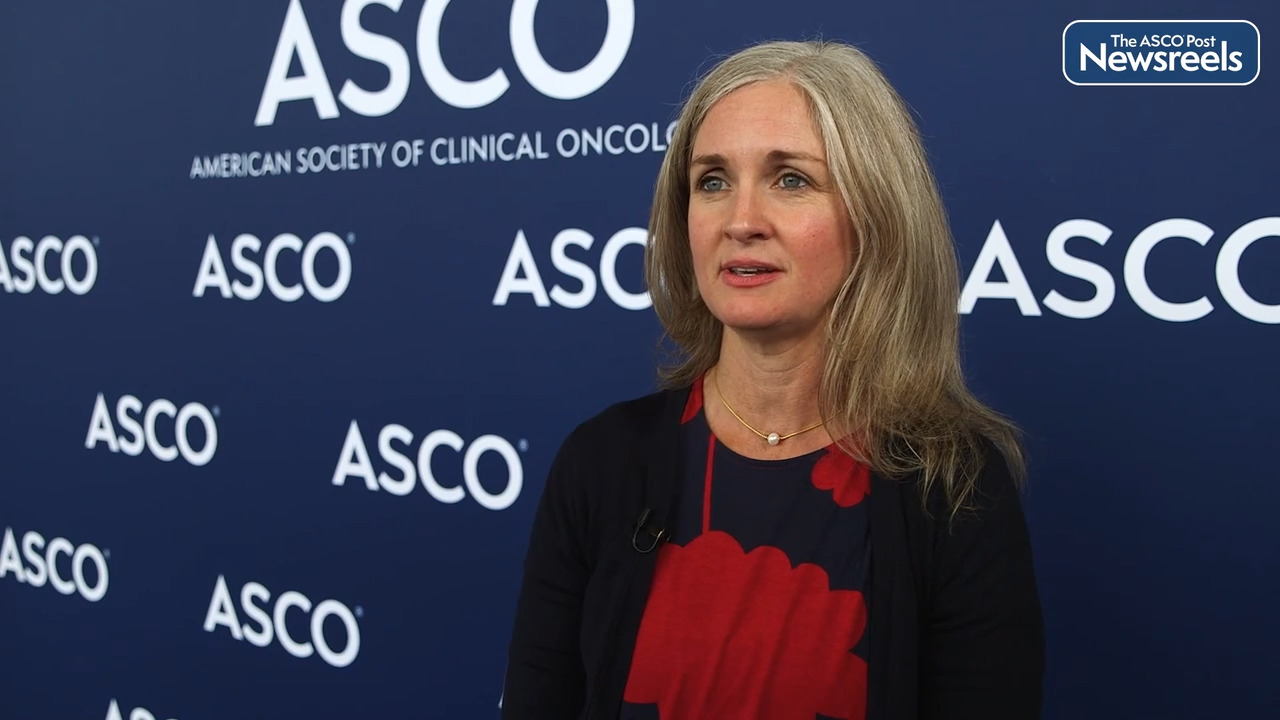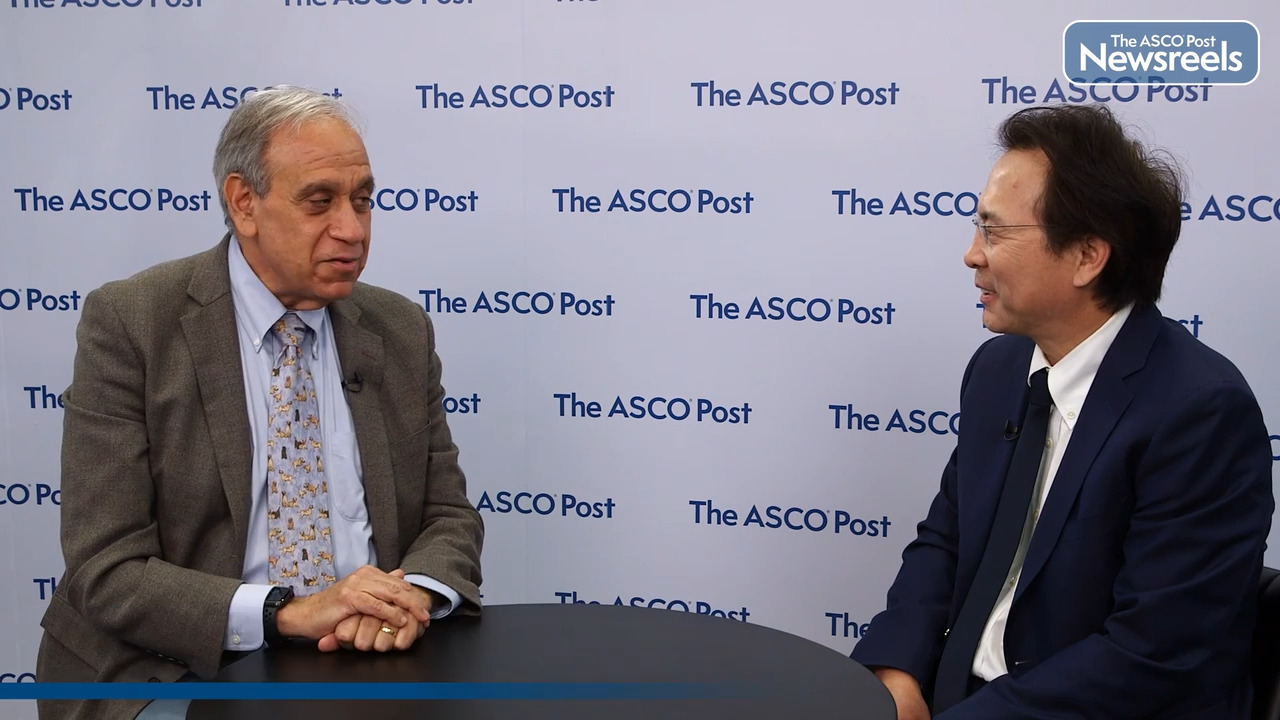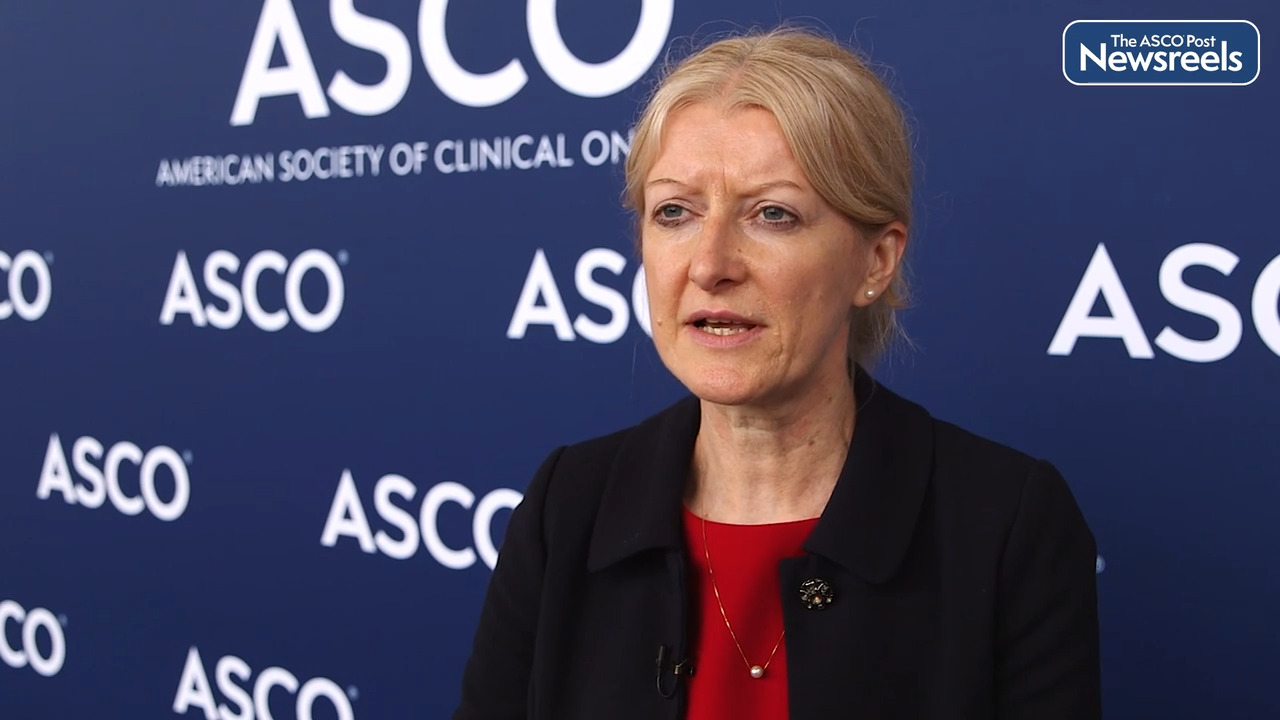Benoit You, MD, PhD, on Ovarian Cancer: Who Benefits From Bevacizumab in the First-Line Setting
2022 ASCO Annual Meeting
Benoit You, MD, PhD, of Lyon University hospital (HCL, France) and GINECO group (France), discusses findings from the GOG-0218 trial of patients with ovarian cancer, which appears to confirm earlier data on the link between poor tumor chemosensitivity and benefit from concurrent plus maintenance bevacizumab. In Dr. You’s validation study, patients who derived the most progression-free and overall survival benefit from bevacizumab were those with high-risk disease (stage IV or incompletely resected stage III) associated with an unfavorable KELIM score (CA-125 kinetic elimination rate constant, calculable online) (Abstract 5553).
Transcript
Disclaimer: This video transcript has not been proofread or edited and may contain errors.
I presented the results of a validation study done in collaboration with the U.S. GOG group about the patients with ovarian carcinoma who have the maximum benefit from bevacizumab. Bevacizumab has been approved for patients with ovarian carcinoma stage 3 and stage 4. However, there is still a big debate about what patients should actually be treated with bevacizumab, because two main large phase III trials had inconsistent outcomes about the characteristics of patients who had a maximum overall survival benefit, and there was no real biomarker of bevacizumab efficacy. So we assume that the tumor primary chemosensitivity, meaning the sensitivity of the tumor to the first cycle of chemotherapy assessed by the model CA-125 kinetic parameter KELIM, could be an interesting parameter. In an initial study with ICON7 trial, we found that among patients with high-risk disease, meaning stage 3 incompletely resected and stage 4 disease, only those who had unfavorable KELIM score, meaning poly-chemosensitive disease, had the benefit from bevacizumab. So, a validation was needed, and this is what we did with the U.S. GOG group on the trial, the GOG-0218 trial. KELIM was assessed by our team, and then we sent the KELIM score to the statistic team of the GOG group. We had very consistent outcomes. In patients with high-risk disease, only those who had unfavorable KELIM score, meaning poly-chemosensitive disease, had the benefit in overall survival by about 6 months, 29 to 35 months. And in patients with low-risk disease, those who had favorable KELIM, meaning highly chemosensitive disease, they had deleterious effect of bevacizumab on the overall survival by about 17 months. So, in conclusion, the two studies are now very consistent in terms of outcomes. We reconcile the data of the two trials. The survivor cures are very, very similar, and we consider that the tumor primary chemosensitivity is probably a biomarker of bevacizumab efficacy. So bevacizumab should be encouraged in patients with high-risk disease and poly-chemosensitive disease, but should be discouraged in patients with low-risk disease and highly chemosensitive disease. Just of note, KELIM can be calculated online for your patient. You will be requested to enter the dates of the first three cycles of chemotherapy, the value of CA-125, and the dates of CA-125. You press compute and you will have the KELIM score for your patients.
Related Videos
The ASCO Post Staff
Rami Manochakian, MD, of Mayo Clinic Florida, discusses the phase II findings of the NADIM II trial, which confirmed that, in terms of pathologic complete response as well as the feasibility of surgery, combining nivolumab and chemotherapy was superior to chemotherapy alone as a neoadjuvant treatment for locally advanced, resectable stage IIIA non–small cell lung cancer (Abstract 8501).
The ASCO Post Staff
Tara B. Sanft, MD, of Yale University, discusses the results of the LEANer study (Lifestyle, Exercise, and Nutrition Early After Diagnosis) in women with breast cancer. It showed that patients with newly diagnosed disease who were just starting chemotherapy could improve physical activity and diet quality. While both groups had high rates of treatment completion, women in the intervention who exercised at or above the recommended levels did better in terms of treatment completion, with fewer dose reductions and delays (Abstract 12007).
The ASCO Post Staff
Timothy J. Whelan, MD, of McMaster University and Hamilton Health Sciences, discusses findings from the LUMINA study, which found that women aged 55 or older who had grade 1–2 T1N0 luminal A breast cancer following breast-conserving surgery and were treated with endocrine therapy alone had very low rates of local tumor recurrence at 5 years. These patients, the research suggests, may be able to forgo radiotherapy (Abstract LBA501).
The ASCO Post Staff
Andrew D. Zelenetz, MD, PhD, of Memorial Sloan Kettering Cancer Center, and Michael L. Wang, MD, of The University of Texas MD Anderson Cancer Center, discuss primary results from the phase III SHINE study, which showed that ibrutinib, in combination with bendamustine/rituximab and rituximab maintenance, may set a new benchmark for patients aged 65 or older with mantle cell lymphoma. With a median progression-free survival of 6.7 years, the ibrutinib combination is more beneficial than currently used chemoimmunotherapy (approximately 1.5–3.5 years) (Abstract LBA7502).
The ASCO Post Staff
Mairéad G. McNamara, PhD, MBBCh, of The Christie NHS Foundation Trust, discusses phase II findings of the NET-02 trial, which explored an unmet need in the second-line treatment of patients with progressive, poorly differentiated extrapulmonary neuroendocrine carcinoma. In the trial, the combination of liposomal irinotecan, fluorouracil, and folinic acid, but not docetaxel, met the primary endpoint of 6-month progression-free survival rate (Abstract 4005).





